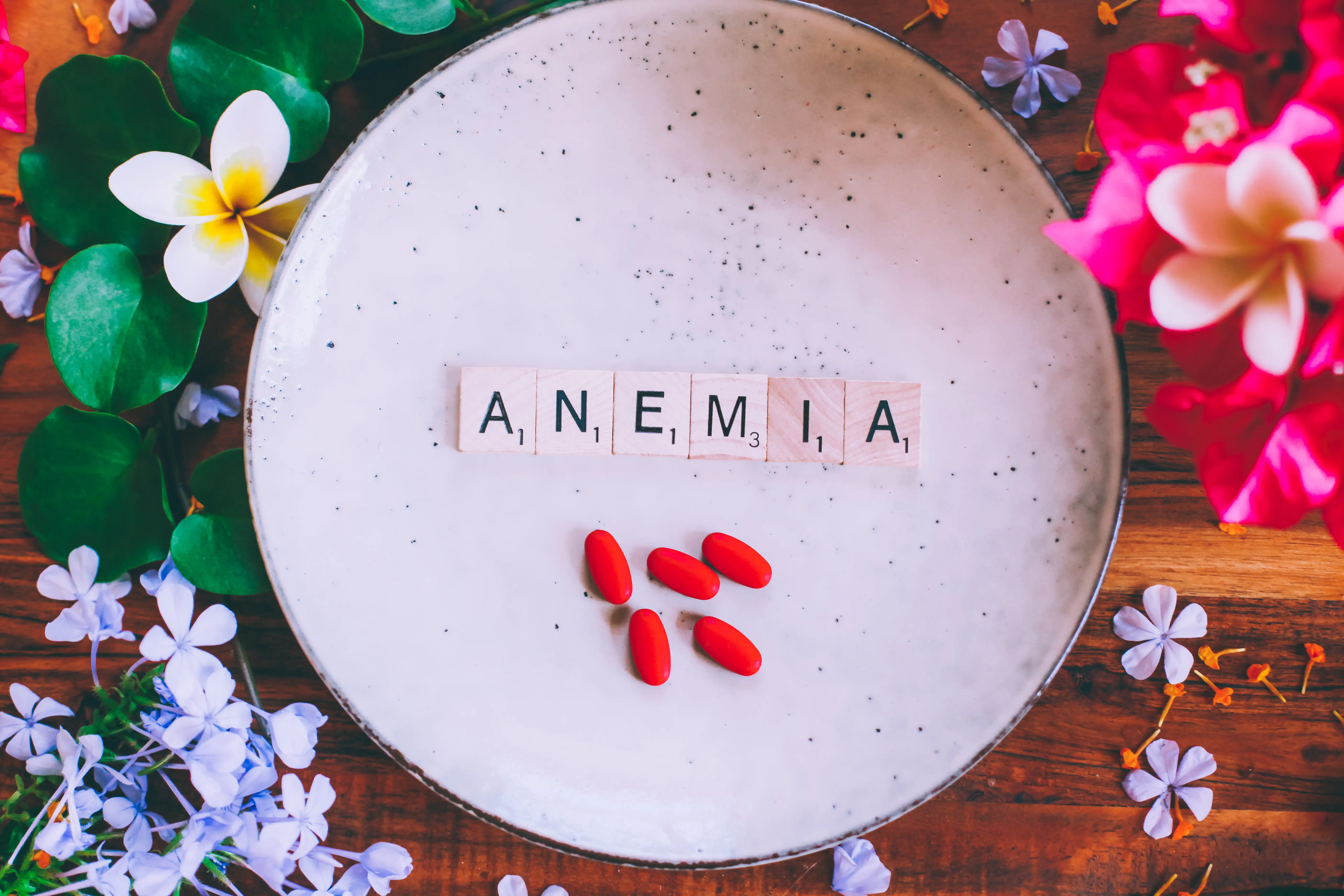Quality sleep is essential for overall health, influencing everything from energy levels to cognitive function and overall daily performance. However, various health conditions can interfere with restful sleep, leading to fatigue and disrupted sleep patterns.
One such condition is anemia, which affects energy levels and contributes to sleep disturbances like insomnia, restless nights, and excessive daytime sleepiness.
Understanding the connection between anemia and sleep can help identify symptoms early and improve both rest and overall health. In this article, we will explore how anemia impacts sleep, its causes and symptoms, and the best treatment options, including ways to improve iron status and address circadian rhythm sleep disorders.
What is anemia?

Anemia occurs when the body lacks sufficient red blood cells or has low hemoglobin levels, the protein that helps transport oxygen. This can result from nutritional deficiencies, chronic diseases, blood loss, or issues with red blood cell production.
Depending on the cause, anemia can range from mild to severe and may require dietary changes, supplements, or medical treatment.
Common Types of Anemia
- Iron-Deficiency Anemia: The most common form, caused by inadequate iron levels, leading to reduced hemoglobin production. It often results from poor diet, blood loss, or absorption issues and can cause anemia fatigue, dizziness, and pale skin. Maintaining proper ferritin levels is crucial for preventing this condition.
- Vitamin B12 Deficiency Anemia: Occurs when the body lacks enough vitamin B12, essential for red blood cell production and nerve function. It can be due to poor diet, absorption issues (such as pernicious anemia), or certain medical conditions.
- Folate Deficiency Anemia: Caused by insufficient folate, a B vitamin necessary for red blood cell formation. This type of anemia can result from poor diet, pregnancy, excessive alcohol use, or conditions affecting nutrient absorption.
- Anemia of Chronic Disease: Associated with long-term illnesses like kidney disease, cancer, or autoimmune disorders, which interfere with red blood cell production. It often develops gradually and may not always cause severe symptoms.
- Sickle Cell Anemia: A genetic disorder in which red blood cells take on a rigid, sickle shape, leading to poor oxygen delivery and painful episodes called sickle cell crises. It primarily affects individuals of certain ethnic backgrounds and requires specialized medical care.
More details on this are discussed below.
Common Symptoms of Anemia
- Fatigue and Weakness: A lack of oxygen-rich blood can leave you feeling constantly tired, weak, and unable to perform daily activities with ease.
- Pale or Yellowish Skin: Reduced red blood cell levels can cause the skin to appear unusually pale or slightly yellow, particularly in the face, lips, and nail beds.
- Shortness of Breath: With lower oxygen circulation, even mild physical activity can make breathing difficult, leading to frequent breathlessness.
- Dizziness or Lightheadedness: Inadequate oxygen supply to the brain may result in dizziness, especially when standing up quickly or after physical exertion.
- Fast or Irregular Heartbeat: The heart works harder to compensate for reduced oxygen levels, potentially causing an increased heart rate and palpitations.
What Causes Anemia?
Anemia occurs when the body lacks enough healthy red blood cells to carry oxygen efficiently. It can be caused by iron, B12, or folate deficiencies; chronic diseases; blood loss; or genetic conditions.
Identifying the specific cause is essential, as treatment varies depending on whether anemia results from vitamin deficiencies, an underlying health condition, or ongoing blood loss.
Iron Deficiency and Inadequate Nutrition
- Low Intake of Iron-Rich Foods: A diet lacking in essential iron sources like red meat, leafy greens, and legumes can result in insufficient hemoglobin production, leading to anemia-related fatigue and weakness.
- Poor Absorption: Conditions such as celiac disease, Crohn’s disease, or gastric bypass surgery can impair the body's ability to absorb iron, even if dietary intake is sufficient.
- Higher Iron Demands: Pregnancy, rapid growth during adolescence, or intense physical activity can increase iron requirements, making it essential to consume enough iron-rich foods to prevent deficiency.
Chronic Illnesses That Contribute to Anemia
- Kidney Disease: The kidneys produce erythropoietin, a hormone that stimulates red blood cell production. When kidney function declines, this process slows, increasing the risk of anemia.
- Autoimmune Disorders: Conditions like rheumatoid arthritis and lupus cause chronic inflammation, which can interfere with the body's ability to produce and maintain healthy red blood cells. This can contribute to fatigue and discomfort, further affecting sleep quality. Choosing a suitable mattress can help alleviate pressure points, provide better support, and improve sleep comfort. Check out our list of the Best Mattresses for Arthritis.
- Cancer and Treatments: Some cancers, as well as chemotherapy and radiation treatments, can suppress bone marrow function, reducing red blood cell production and leading to anemia.
Blood Loss
- Heavy Menstruation: Prolonged or abnormally heavy menstrual bleeding can gradually deplete the body's iron stores, increasing the risk of iron-deficiency anemia over time.
- Gastrointestinal Bleeding: Chronic bleeding from ulcers, polyps, or conditions like inflammatory bowel disease can cause slow blood loss, contributing to anemia without obvious symptoms.
- Blood Loss from Surgery, Injury, or Frequent Donations: Significant or repeated blood loss from medical procedures, accidents, or frequent blood donation can lower iron levels and hinder the body's ability to replenish red blood cells.
Medications
- Blood Thinners: Medications like aspirin, warfarin, or heparin increase the risk of internal bleeding, which can lead to gradual blood loss and anemia over time.
- Antacids and Acid Blockers: These medications reduce stomach acid, which is necessary for absorbing iron from food, potentially contributing to iron deficiency.
How Anemia Affects Sleep Quality

Anemia doesn’t just cause daytime fatigue or cognitive impairment; it can also interfere with sleep. When oxygen levels are low, the body struggles to maintain restful sleep, leading to disruptions throughout the night.
Sleep assessment in individuals with anemia often reveals poor sleep efficiency, hyper-arousability, frequent awakenings, reduced deep sleep, and impaired sleep maintenance.
Many people with anemia experience restlessness, difficulty falling asleep, or waking up feeling unrefreshed.
Low Oxygen Levels and Sleep Disruptions
Anemia reduces the amount of oxygen circulating in the body, which can impact sleep by causing shortness of breath and restlessness.
When oxygen levels drop at night, it may interfere with circadian rhythms, leading to frequent awakenings, shallow breathing, or disruption of the sleep-wake cycle. Over time, this can result in chronic sleep deprivation and overall poor sleep quality.
Because anemia impacts oxygen transport in the body, it can also disrupt neurotransmitter function, affecting serotonin levels, which play a key role in sleep regulation.
Restless Legs Syndrome (RLS) and Anemia
Iron deficiency is a known trigger for RLS, a condition that causes uncomfortable sensations and paresthesia in the legs, often worsening at night.
Periodic limb movements in sleep (PLMS) are also common in individuals with RLS, leading to frequent sleep disruptions. This persistent urge-to-move feeling can make it difficult to fall and stay asleep, leading to frequent disruptions. Since anemia and restless legs syndrome are linked, treating iron deficiency may help alleviate symptoms and improve sleep.
Night Sweats and Temperature Regulation Issues
Anemia can interfere with the body's ability to regulate temperature, sometimes leading to sudden night sweats.
The body may struggle to maintain a stable internal temperature, causing excessive sweating and discomfort during sleep. This can lead to a shorter sleep duration, frequent awakenings, and difficulty falling back asleep.
Serotonin, Neurotransmitters, and Sleep Regulation
Serotonin is essential for sleep regulation, as it helps produce melatonin, the hormone that controls sleep-wake cycles. Since iron is needed for proper neurotransmitter function, iron deficiency can lead to disruptions in serotonin levels, contributing to insomnia and poor sleep quality.
Brain Fog and Daytime Fatigue
When the brain doesn’t receive enough oxygen due to anemia, cognitive function can suffer, resulting in brain fog, trouble concentrating, and forgetfulness.
Sleep disturbances caused by anemia can further contribute to persistent daytime fatigue and sluggishness. This combination of poor sleep and reduced oxygen supply can make daily tasks feel exhausting and mentally draining.
Increased Risk of Sleep Disorders
- Insomnia: Anemia can interfere with the ability to fall and stay asleep due to low oxygen levels causing brain changes, anemia fatigue, and restless legs. Over time, this can contribute to chronic insomnia, leading to difficulties with sleep onset. Some individuals with anemia may turn to sleep medicine to manage insomnia or disrupted sleep, but addressing the underlying cause, such as low iron levels, can be a more effective long-term solution.
- Sleep Apnea: Low red blood cell levels in anemia can reduce oxygen circulation, potentially worsening sleep apnea and other sleep-disordered breathing conditions. This condition, where breathing repeatedly stops and starts during sleep, can lead to frequent awakenings and daytime exhaustion.
- Hypersomnia: Low red blood cell levels in anemia can reduce oxygen circulation, potentially worsening sleep apnea, leading to hypersomnia. This condition, where breathing repeatedly stops and starts during sleep, can lead to frequent awakenings and daytime exhaustion.
- Attention Deficit Hyperactivity Disorder (ADHD): Low iron levels, a common cause of anemia, have been linked to ADHD symptoms. Iron is essential for dopamine regulation, a neurotransmitter involved in focus and impulse control. Studies suggest that children and adults with ADHD often have lower ferritin (stored iron) levels.
How to Improve Sleep With Anemia
Managing anemia effectively can help reduce sleep disturbances and improve overall rest. Addressing the underlying cause, optimizing diet, and making sleep-friendly lifestyle adjustments can all contribute to better sleep quality. Here are some key strategies you can follow to enhance the quality of your sleep.
Diet and Lifestyle Changes for Better Sleep
- Improving Sleep Hygiene: Establishing a consistent bedtime routine, reducing screen time at night, and ensuring a cool, dark, and quiet sleep environment can improve sleep quality and reduce nighttime awakenings.
- Hydration and Blood Circulation: Drinking enough water throughout the day supports proper blood flow and oxygen delivery. Proper hydration helps minimize symptoms like dizziness, headaches, and muscle cramps that may interfere with sleep.
- Iron-Rich Diet: Eating iron-rich foods such as lean meats, leafy greens, and legumes helps replenish iron stores, reducing fatigue and improving both daytime energy levels and nighttime sleep quality.
- Vitamin C for Better Iron Absorption: Combining iron sources with vitamin C-rich foods like oranges, strawberries, or bell peppers enhances iron absorption, ensuring better red blood cell production and improved oxygen circulation.
- Consistent Sleep Schedule: Going to bed and waking up at the same time every day helps regulate the body's circadian rhythm, reducing feelings of exhaustion and promoting deeper, more restorative sleep.
- Stress Reduction Techniques: Relaxation methods like meditation, deep breathing exercises, and gentle yoga can help manage stress and anxiety, preventing them from interfering with sleep and overall well-being.
- Regular Physical Activity: Engaging in relaxation techniques or moderate exercise, such as walking or swimming, can improve blood circulation and energy levels. However, it's best to avoid vigorous workouts close to bedtime to prevent sleep disruptions.
- Avoiding Stimulants: Limiting caffeine, nicotine, and other stimulants, particularly in the late afternoon and evening, can prevent sleep disturbances and help maintain a stable sleep cycle.
Medical Treatments for Anemia
- Iron Supplements: Oral iron supplementation helps replenish iron stores, addressing anemia-related fatigue and improving oxygen levels for better sleep.
- Vitamin B12 or Folate Injections: For those with absorption issues, B12 or folate injections can help restore red blood cell production and prevent related sleep disruptions.
- Erythropoiesis-Stimulating Agents (ESAs): These medications stimulate red blood cell production in cases of severe anemia caused by chronic illness or kidney disease.
- Treating Underlying Conditions: Managing health conditions like kidney disease, autoimmune disorders, or chronic inflammation can help prevent anemia from recurring.
FAQs
Can anemia cause sleep problems?
Yes, anemia can contribute to sleep issues by causing fatigue, restless legs syndrome, and low oxygen levels, leading to difficulty falling asleep, frequent wake-ups, and overall poor sleep quality.
How can I sleep better with anemia?
Improving your diet with iron-rich foods, taking supplements if needed, maintaining a consistent sleep schedule, and creating a relaxing sleep environment can help reduce sleep disturbances caused by anemia.
Does taking iron at night keep you awake?
Taking iron at night may affect sleep by influencing a circadian rhythm sleep disorder or restless legs syndrome. However, correcting iron deficiency can improve cognitive performance and overall sleep quality.
Can sleep apnea cause anemia?
Yes, sleep apnea can contribute to anemia by reducing oxygen levels in the blood, which affects red blood cell production. Poor oxygenation may lead to low hemoglobin levels, increasing fatigue and other anemia symptoms.
Can iron supplements cause insomnia?
Iron supplements don’t typically cause insomnia, but excessive intake may lead to sleep disturbances. Changes in transferrin saturation can affect neurotransmitter balance, influencing sleep patterns. In rare cases, iron supplementation may contribute to parasomnias, such as restless sleep or vivid dreams.
Conclusion
Anemia can significantly impact sleep quality, leading to fatigue, restless nights, and increased risk of sleep disorders. Addressing anemia through proper treatment, diet, and lifestyle changes can help restore energy levels and improve overall well-being.
By managing iron levels, maintaining healthy sleep habits, and seeking medical guidance when needed, you can reduce anemia-related sleep disruptions and enjoy more restful, rejuvenating sleep.
Dom Abraham
As the lead content writer at Sleepiverse. Dom pours his heart into writing mattress reviews, bedding product reviews, and medically-reviewed health articles. Dom is from Portugal and likes to spend his free time writing on the beach as it gives him a sense of comfort. Aside from writing mattress reviews in front of the soothing beach view, Dom likes to experiment with new amazing food ideas.


